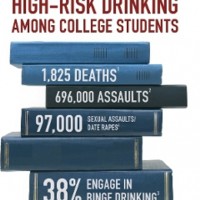Education
Fall Semester: A Time for Parents to Discuss the Risks of College Drinking
As college students arrive on campus this fall, it's a time of new experiences, new friendships, and making memories that will last a lifetime. Unfortunately for many, it is also a time of excessive drinking and dealing with its aftermath—vandalism, violence, sexual aggression, and even death.
According to the 2014 National Survey on Drug Use and Health (NSDUH), 59.8 percent of full-time college students ages 18 to 22 drank alcohol in the past month; 37.9 percent engaged in binge drinking (five or more drinks on an occasion); and 12.2 percent engaged in heavy drinking (five or more drinks on an occasion on five or more occasions per month). These rates are higher than those for their non-college attending peers.
The consequences of excessive drinking by college students are more significant, more destructive, and more costly than many parents realize. And these consequences affect students whether or not they drink.
Statistics from the National Institute on Alcohol Abuse and Alcoholism (NIAAA) indicate that drinking by college students ages 18 to 24 contributes to an estimated 1,825 student deaths, 696,000 assaults by another student who has been drinking, and 97,000 cases of sexual assault or date rape each year.
Early Weeks Are Critical
Although the majority of students come to college already having some experience with alcohol, certain aspects of college life, such as unstructured time, the widespread availability of alcohol, inconsistent enforcement of underage drinking laws, and limited interactions with parents and other adults, can intensify the problem.
The first six weeks of freshman year are a vulnerable time for heavy drinking and alcohol-related consequences because of student expectations and social pressures at the start of the academic year.
Parents Can Help
An often-overlooked protective factor involves the continuing influence of parents. Research shows that students who abstain from drinking often do so because their parents discussed alcohol use and its adverse consequences with them. During these crucial early weeks, parents can do a number of things to stay involved.
Parents can help by:
- Talking with students about the dangers of harmful and underage college drinking—such as the penalties for underage drinking, and how alcohol use can lead to date rape, violence, and academic failure.
- Reaching out periodically and keeping the lines of communication open, while staying alert for possible alcohol-related problems.
- Reminding students to feel free to reach out to them to share information about their daily activities, and to ask for help if needed.
- Learning about the school's alcohol prevention and emergency intervention efforts.
- Making sure students know signs of alcohol overdose or an alcohol-related problem, and how to help.
Resources Are Available
For parents who want to discuss the consequences of college drinking with their sons and daughters, a variety of helpful resources are available from NIAAA at www.CollegeDrinkingPrevention.gov.
These resources include a parents' guide that offers research-based information plus helpful advice on staying involved during the freshman year, and getting assistance if faced with an alcohol-related crisis.
The website also provides links to alcohol policies at colleges across the country, an interactive diagram of how alcohol affects the human body, and an interactive alcohol cost calculator.


